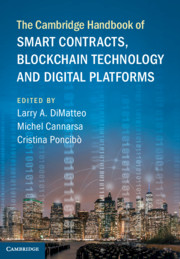Book contents
- The Cambridge Handbook of Smart Contracts, Blockchain Technology and Digital Platforms
- The Cambridge Handbook of Smart Contracts, Blockchain Technology and Digital Platforms
- Copyright page
- Dedication
- Summary of Contents
- Contents
- Contributors
- Preface
- Part I General Framework
- Part II Contract Law and Smart Contracts
- Part III Electronic Platforms and Networks
- Part IV Privacy, Security and Data Protection
- 11 Blockchain and Data Protection
- 12 Data Protection in Hybrid Worlds
- 13 Smart Contracts
- 14 Algorithmic Contracts and Consumer Privacy
- Part V Smart Contracts
- Part VI Future of Smart Contracts, Blockchain and Artificial Intelligence
13 - Smart Contracts
Issues of Property and Security Rights
from Part IV - Privacy, Security and Data Protection
Published online by Cambridge University Press: 25 October 2019
- The Cambridge Handbook of Smart Contracts, Blockchain Technology and Digital Platforms
- The Cambridge Handbook of Smart Contracts, Blockchain Technology and Digital Platforms
- Copyright page
- Dedication
- Summary of Contents
- Contents
- Contributors
- Preface
- Part I General Framework
- Part II Contract Law and Smart Contracts
- Part III Electronic Platforms and Networks
- Part IV Privacy, Security and Data Protection
- 11 Blockchain and Data Protection
- 12 Data Protection in Hybrid Worlds
- 13 Smart Contracts
- 14 Algorithmic Contracts and Consumer Privacy
- Part V Smart Contracts
- Part VI Future of Smart Contracts, Blockchain and Artificial Intelligence
Summary
The chapter focuses, in the area of property and security rights, on the interface between the virtual and transnational dimension of transactions on the blockchain on one hand and the “real” world of compulsory and public policy rules applying on a given territory and on given property on the other. The author takes the perspective of a continental lawyer analyzing the validity of transactions, the validity and integrity of the property title electronically created and transferred. In doing so, he relies not only on the traditional legal tools but also on the most recent legislative initiatives, especially in France, introducing a legal framework encompassing new ways of transferring property (based on blockchain technologies) and new titles (e.g., tokens in the context of initial coin offerings). Through this analysis, the core issue is to determine whether these new transactions and these new property titles can be effective, in a national and international context. The author raises questions and concerns about the actual legal uncertainty and the best (local and global) regulatory responses to the technological challenges.
Information
- Type
- Chapter
- Information
- The Cambridge Handbook of Smart Contracts, Blockchain Technology and Digital Platforms , pp. 240 - 250Publisher: Cambridge University PressPrint publication year: 2019
